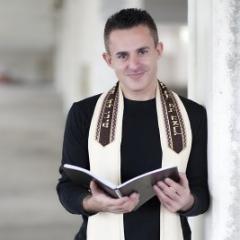
Interview with Cantor Mark Goldman
You’ve been quite involved in the ACC, what roles have you taken on? How has this changed your perspective on the ACC? On being a Cantor?
Former ACC president, Cantor Richard Cohn invited me to be a regional representative to the Executive Board about twelve years ago. From that point on I served on various committees, the board, two vice-president portfolios and ultimately I was the Conference president from June 2013 through June 2016. A month ago, I was sipping mimosas on a beach in Fort Lauderdale enjoying my retirement without a care in the world when Cantor Steven Weiss asked me to chair the Nominations Committee. There's nothing I wouldn't do for Steven.
Before my involvement in the Conference, my perspective was limited to ways in which the ACC could support me in my calling as a Cantor. Through the passage of time and life experiences I've come to appreciate and hold dear the tireless efforts of our Conference to impact our membership, our movement, and our progressive Jewish values. I feel so blessed.
In regards to LGBTQ issues, what role do you see the ACC playing?
When I attended my first ACC convention in 1995, few Cantors were "out." I remember a secret meeting convened by Cantor Evan Kent for ACC LGBT members. There was no 'Q' at that time. Thanks to Evan, Cantor Don Croll, and other pioneers, the ACC not only became a safe place for gay & lesbian cantors but an example for our entire movement. Thanks to Cantor Jason Kaufman, and the work of the social action committee, we continue to be an important voice for LGBTQ inclusion and liberty in our community.
What do you see as the biggest challenge facing the cantorate and/or ACC now and in the future?
ACC cantors are highly sought after, well regarded and indispensable to congregations seeking innovation coupled with expertise and dedication. Having said that, the landscape of progressive Jewish life continues to change rapidly. Our movement needs to jump ahead of this wave, in much the same way our Conference has over the past decade. Ultimately, the macro changes in Jewish life will require us to once again retool and rethink. With a new sense of confidence and boldness, my hope is that cantors take the helm with our rabbinic colleagues in the reshaping of Jewish communal life.
In your experience, what is the best part of being a cantor?
Serving the same congregation for 21 years, I can safely say that it's the relationships, friendships, and community that have brought me the greatest happiness and fulfillment.
How or why did you decide to become a cantor?
My earliest memories revolve around the shul I attended with my father (zl), singing from the bima with my cantor, and feeling part of something wonderful. My grandfather (zl) was a cantor in Poland before WWII and then in London. I've always wanted to be a cantor. It's in my soul.
Tell us something about yourself that we might not know.
My middle name is Clifford. It's kind of cool in the U.K. where I grew up. Not so much here.
Cantor Mark Goldman, Co-Senior Clergy of Temple Kol Ami Emanu-El in Plantation, Florida, is a descendant of generations of Cantors. Born in London, England, he pursued Cantorial studies as well as a B.A. (honors) degree in Judaic Studies at the London School of Jewish Studies. He is the youngest ever recipient of certification by the Chief Rabbi of The United Kingdom. Mark attended the internationally acclaimed Eastman School of Music where he gained a Master of Music Degree in Performance and Literature.
As co-senior clergy, Mark is intimately involved in congregational strategic planning and visioning, as well as marketing, membership, tikkun olam, continuing education and fundraising. Mark is the immediate past president of the American Conference of Cantors, where he served with distinction and was the first openly gay president of a major clergy organization.
When Mark isn't at the Temple, and can be pulled away from his phone, he enjoys spending time with his life partner, Aaron Taber.

